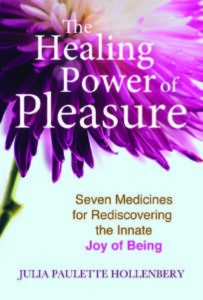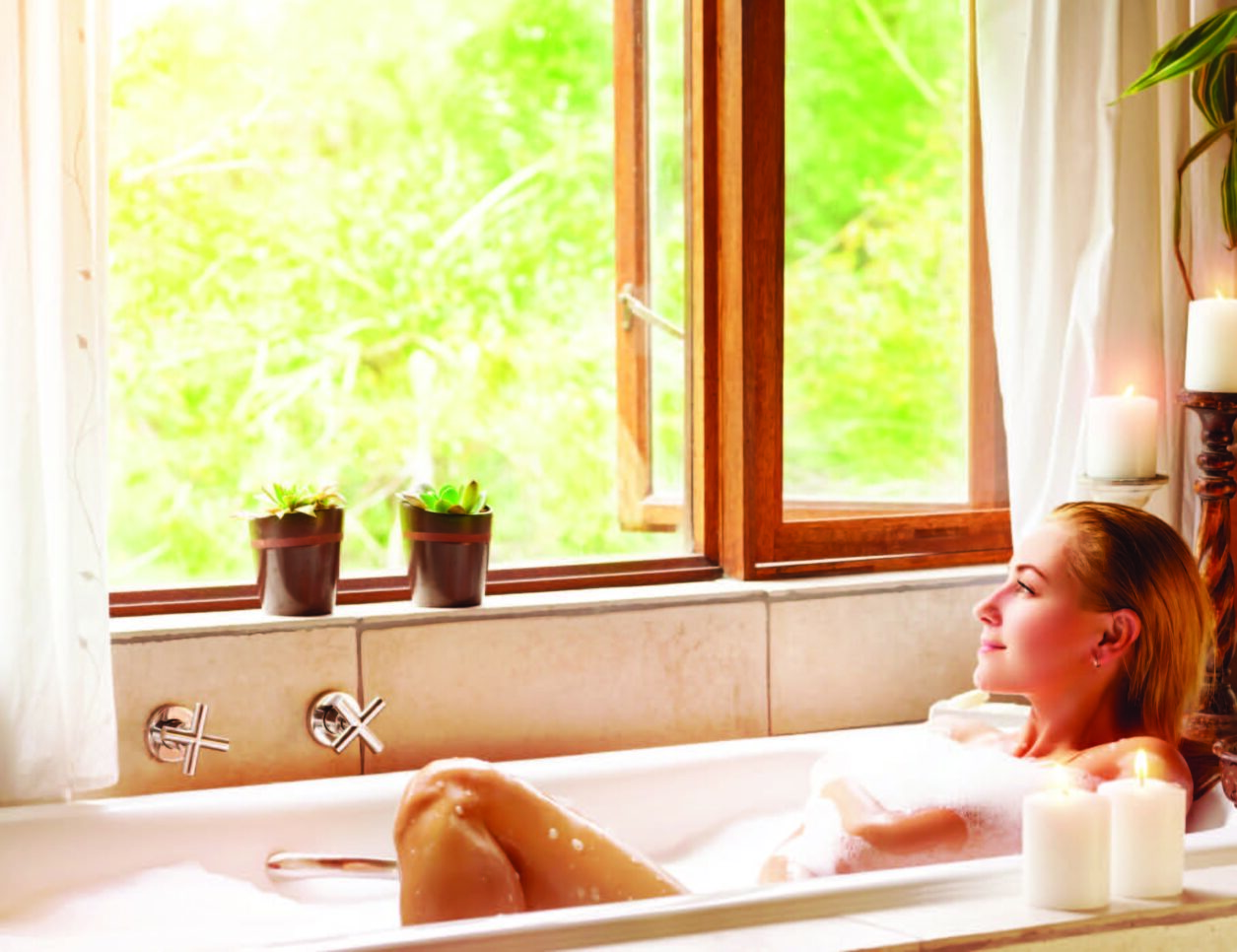We are hardwired from birth for sexual pleasure.
Dr. Christiane Northrup, women’s health expert
Beauty is truth, truth beauty
John Keats, physician and poet
Soul is the source of the erotic
Roger Housden, spiritual writer
Pleasure is our true nature. What if pleasure is already here, intrinsic to our life, and simply waiting for us to notice it?
Pleasure has become conflated with sexuality and many of the other sensual pleasures have been forgotten. When, for example, was the last time you bent to smell a rose? Or appreciated a glorious sunset? Or really tasted your coffee? We all need a regular pleasure practice and I don’t mean masturbation. I mean a practice of paying attention to the pleasure that exists. Our noticing reveals to us the pleasure that is already within us and all around us. And so we can relax. We can each find our own unique personal enjoyment of pleasure.
Unfortunately, most of us don’t even have the basic five senses of touch, taste, sight, smell and sound fully open. We usually perceive only a fraction of what is really there. Rudolf Steiner described twelve senses, including touch, movement, balance, warmth, language and health. This is similar to Harvard professor Howard Gardner’s theory of multiple intelligences, which he developed in the 1990s. As we begin to open ourselves up to a broader concept of pleasure, how much more might we wisely enjoy?
Closely related to pleasure, sensuality is expressed differently in every part of the world: in Mediterranean Europe, it’s found in the sunshine, sea, food and art. In Japan, it appears in sumptuous fabrics, gardens, spaces and a cultural sensitivity to energy. In Eastern Europe, there is a creativity of original colour and music. The French have a famously sexy approach to beauty, food and humour. In the Middle East, the approach is direct and open. Who are you sensually? What lights you up? How do you live your pleasure every day? By exploring our pleasure, we create a positive vortex, sharing nourishment, enjoyment and satisfaction.
Self-Denial
Let’s start with where we are now. We often think of pleasure as something we really should deny ourselves. Best to work first, enjoy later! Yet in modern Japan some people have died from overwork. For most of us, pleasure has become a fleeting future reward for all our efforts, a carrot on a stick that we strive towards, something we then absolutely deserve, like chocolate, beer, shopping, a holiday or sex.
We usually push ourselves hard now, ignoring our bodies, in order to get the work done and gain that future treat. We abandon the experience of this moment in favour of an idea of a “better” future moment. Everything is done in order to get something else. Little is done for the sake of itself. As a friend once said, “I was treating myself well in order to get better, rather than just treating myself well.”
As we push ourselves harder, faster and further, to reach the always just-out-ofreach future pleasure, our tension and frustration build up. We become addicted to the anticipated reward, feeling entitled and voracious in our hunger: we demand our expectation to be fulfilled, narrowing our focus and hunting it down. This attitude is exhausting and disrespectful to everyone involved. It creates the disharmony and dissatisfaction in relationships that many people experience. Even sex then becomes a form of stress relief. How did pleasure get to be so distorted?
Shame and Holiness
The essential wholeness of life in antiquity was divided by organized religions into either good or bad facets. Pride was encouraged in the elevated masculine — in the mind, rationality, work, territory, individuality, heaven, order and god; as opposed to the apparent shamefulness of the feminine with its associations with the body, Earth, pleasure, sexuality, instinct, inclusion, chaos and the devil. We became divided against ourselves … and against each other.
There have been many repressive cultures throughout history and around the world. Some Buddhists and Puritan Christians regarded pleasure as bad, dangerous, dirty and primitive. Variously, dancing, drinking, card-playing, and sexuality have all been seen as sinful. A woman’s hair and legs had to be kept hidden from view. In the Catholic Church, the litmus test for sin is still the question: did you take pleasure in it? Much of the world has an implicit understanding that pleasure must be limited or stopped in order to maintain the social fabric. We think humans are not to be trusted, and it’s safest for us not to be embodied in our sensuality.
Often almost as soon as we notice pleasure, we squash it back immediately. We feel guilty. We are afraid of melting, being undone, losing control . . . and where might it lead? To natural wildness! Despite the constantly titillating sexual imagery, we have become cut off from ourselves and from what is going on in our bodies. We think this sad state of being is normal. We are a most unsensual culture.
The resolution of shame comes when we can understand that the body is not just the location of our pain, but of pleasure and the whole spectrum of experience too, and that it is all wholly and intrinsically holy.
Pleasure Is Positive
A holistic view of the body is healthy. In many ancient cultures, the body was respected as the site of fertility, gestation and birth, while sexuality was appreciated as a powerful and positive force. It was understood that the earth and sky made love and produced the crops. Ancient life was not perfect, but it did integrate the material and the spiritual, the feminine and the masculine, into one whole.
Pleasure is a natural positive feedback system. We are on the right track when we feel good! Babies and children naturally seek pleasure. Breastmilk is delicious and nutritious. Hugging and touching are delightful as well as reassuring. Nature’s colours and fragrances show us which nutritious foods to pick. Sexual pleasure is a great encouragement to reproduce our species.
Pleasure is our birth right, a whole-body experience of relaxation and expansion, aliveness, instinct, curiosity and interest, fully present and full of energy. When we are experiencing delicious pleasure, it often has a positive immediate effect on other people’s bodies. We can all relax . . .
It can be a pleasure to witness another really enjoying themselves. Pleasure is magnetic. A child’s laughter is contagious. Seeing someone absorbed in a physical or creative task is compelling. We can revel in another’s sexual pleasure: what is good for me, is often good for us. We all benefit. Pleasure is a form of nourishment. It is something we need on a daily basis to be healthy.
How do we behave when we don’t feel safe and don’t have enough? We become cranky and try to grab some from others in a win–lose dynamic. Desire is a powerful force that needs to be honoured, contained and enjoyed. It can leak out in inappropriate ways, distorting from natural flow into greedy power-over-others dominance. We are seeing an uncovering of abuse within the Church, Hollywood and spiritual organizations. If pleasure is not allowed, it gets perverted. It is not that pleasure itself is perverse. We need to acknowledge the fundamental importance of pleasure.
Self-Authority
Very few of us grew up with parents who were not complicated in some way around sexual energy. Children love to be in bodily contact with their parents and children sometimes touch their own genitals. Often this natural behaviour is interpreted by adults as being sexual, rather than simply sensual and wholesome, an in-the-moment exploration of feel-goodness in a child’s own body.
As children, we have a real need to belong. We often give up our sense of what is right and good in order to fit in with the opinions of others in authority, such as parents, teachers, adults and priests. We need them to approve and validate us. The cost of belonging – to our family, school, religion or nation – can be a reduction in our enjoyment. We learn to follow the system’s rules about goodness and pleasure, guilt and innocence, rather than our own.
Most children are taught that the locus of authority lies outside them. Adults frequently tell them they are “good” or “bad” to reward or punish them, and to reinforce what suits themselves. Being “good” often means fitting in and being deserving of social approval – it is not the same as being morally good. Children come to expect praise, and be disappointed if it is absent.
In this way, we learn as babies and children that pleasure comes from outside of ourselves. We confuse our childhood authority figures with the other people around us now. As adults, we often still hang on to our early fears of being “too much” for others, if we are as fully vibrantly and dynamically alive as we naturally uninterrupted are.
As adults, we need to discover that nothing nourishes us as much as our inner capacity for pleasure. We need space to viscerally experience our satisfactions and frustrations. To sense for ourselves our interactions and interface with the world. This is how we will create freedom from a false consideration of others and from external tyranny over our naturally wild soul. To reclaim our pleasure, we need to reorient our sense of authority from the outside to ourselves. Permission to experience life is given by us to us: we become the location of our pleasure, here in our own body.
Soothing and Healing
Pleasure is a natural mechanism for healing. Many delights such as pleasing art, music, food, conversation and loving physical intimacy are soothing and healing. Laughter is particularly good. When we are enjoying ourselves, we breathe more deeply than usual, thereby relaxing muscular tension, releasing the charge of our nervous system and expelling cellular toxins. When we are happy, satisfied and relaxed, we transmit positivity, creating happiness and relaxation in others. We become a contributing part of a mutually uplifting and healing society.
Arising in Relationship
Real pleasure occurs in relationship. It is from within the crucible of a relationship between any two things that pleasure arises. Pleasure is the alchemical texture of relationship. It can be a momentary or lifelong relationship with any two or more things – people, animals, insects, plants, objects, elements, sounds, smells, archetypes, sensations, feelings … anything at all! Every encounter, such as a hand on the earth or a gaze resting on a tree, is a potential source of pleasure. Every impression, every contact, every sensory exchange can lead to pleasure.
There is a spark of electricity, creativity and pleasure in the meeting between two. Pleasure comes from the authenticity of the contact between them. Real me meeting real you is such a pleasure. Pleasure is personal. It defies definition, categorization and measurement.
It is undeniable.

 Julia Paulette Hollenbery is a body worker, therapist, mystic, healer, and facilitator. For more than 25 years she has guided countless clients into deep confidence and selfauthority. Julia is passionate about sharing her life-long love of the mystery, real sensual relationship, and the life of the mystery, real sensual relationship, and the life of the body. https://universeofdeliciousness.com/
Julia Paulette Hollenbery is a body worker, therapist, mystic, healer, and facilitator. For more than 25 years she has guided countless clients into deep confidence and selfauthority. Julia is passionate about sharing her life-long love of the mystery, real sensual relationship, and the life of the mystery, real sensual relationship, and the life of the body. https://universeofdeliciousness.com/



















